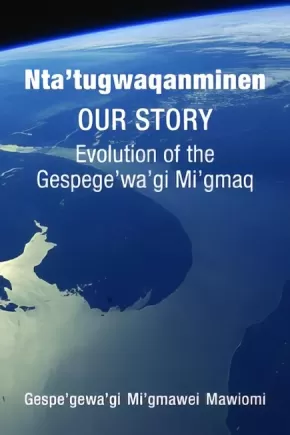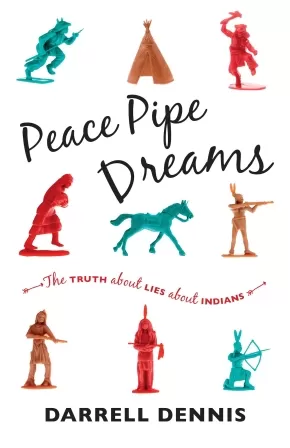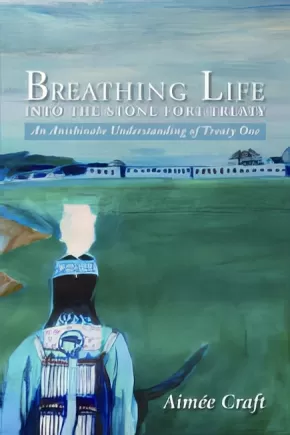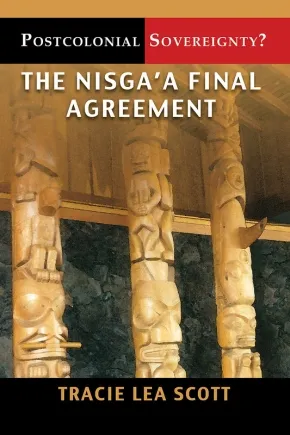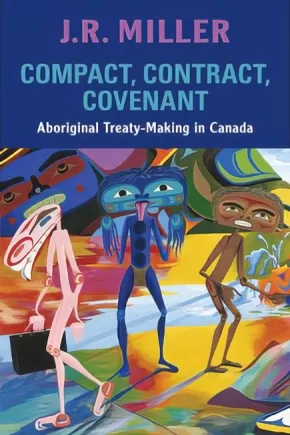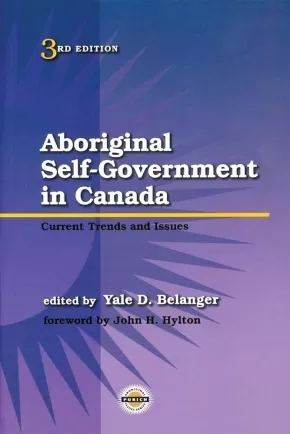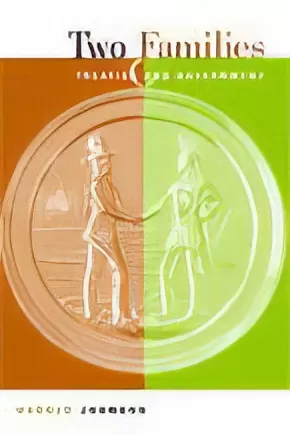Treaties
Synopsis:
Delgamuukw. Sixties Scoop. Bill C-31. Blood quantum. Appropriation. Two-Spirit. Tsilhqot’in. Status. TRC. RCAP. FNPOA. Pass and permit. Numbered Treaties. Terra nullius. The Great Peace…
Are you familiar with the terms listed above? In Indigenous Writes, Chelsea Vowel, legal scholar, teacher, and intellectual, opens an important dialogue about these (and more) concepts and the wider social beliefs associated with the relationship between Indigenous peoples and Canada. In 31 essays, Chelsea explores the Indigenous experience from the time of contact to the present, through five categories – Terminology of Relationships; Culture and Identity; Myth-Busting; State Violence; and Land, Learning, Law, and Treaties. She answers the questions that many people have on these topics to spark further conversations at home, in the classroom, and in the larger community.
Reviews
"Chelsea attacks issues head on, with humour and wit, sarcasm and cynicism and clear, concise and well-organized information. She makes further research easy, as every chapter includes copious endnotes with links to her curated resources. She explains the terminology of identity — status, non-status, registered, membership, Métis, Inuit, cultural appropriation and two-spiritedness." —Nancy Adams-Kramp
"While subtitled A Guide to First Nations, Métis and Inuit Issues in Canada, it would be a mistake to see Indigenous Writes as a book primarily about Indigenous people. Instead, it is much more about all of us — our relationship as non-Indigenous and Indigenous Canadians, and how it has been shaped (and misshaped) by the historic and contemporary governance of these issues.
For any Canadian who wishes to have an informed opinion about the country that we share — or, more to the point, publicly share that opinion — Indigenous Writes is essential reading."—Michael Dudley
Educator & Series Information
This book is part of the Debwe Series.
For all teachers.
Approved for Manitoba classrooms.
ERAC approved.
Additional Information
291 pages | 7.00" x 9.00"
Synopsis:
Nta’tugwaqanminen provides evidence that the Mi’gmaq of the Gespe’gewa’gi (Northern New Brunswick and the Gaspé Peninsula) have occupied their territory since time immemorial. They were the sole occupants of it prior to European settlement and occupied it on a continuous basis. This book was written through an alliance between the Mi’gmaq of Northern Gespe’gewa’gi (Gaspé Peninsula), their Elders and a group of eminent researchers in the field with the aim of reclaiming their history, both oral and written, in the context of what is known as knowledge re-appropriation. It also provides non-Aboriginal peoples with a view of how Mi’gmaq history looks when it is written from an Indigenous perspective.
There are two voices in the book — that of the Mi’gmaq of the Gespe’gewa’gi, including the Elders, as they act as narrators of the collective history, and that of the researchers, who studied all possible aspects of this history, including advanced investigation on place names as indicators of migration patterns.
Nta’tugwaqanminen speaks of the Gespe’gewa’gi Mi’gmaq vision, history, relation to the land, past and present occupation of the territory and their place names and what they reveal in terms of ancient territorial occupation. It speaks of the treaties they agreed to with the British Crown, the respect of these treaties on the part of the Mi’gmaq people and the disrespect of them from the various levels of governments. This book speaks about the dispossession the Mi’gmaq of Gespe’gewa’gi had to endure while the European settlers illegally occupied and developed the Gaspé Peninsula to their own advantage and the rights and titles the Mi’gmaq people still have on their lands.
Author Note: The Gespe’gewa’gi Mi’gmawei Mawiomi is the organization that represents the three communities of the northern part of Gespe’gewa’gi. Research associates Richard Jeannotte and Donald Jeannotte, both Gespe’gewa’gi Mi’gmaqs, and Danielle E. Cyr, senior scholar at York University, wrote the seven first chapters. Troy Jerome, current Mi’gmawei Mawiomi Secretariat Executive Director / Nutewistoq wrote Chapter 8.
This book would be useful for courses in social studies, history, and English language arts. Recommended for grades 8-12, as well as college/university courses.
Foreword by Satsun (Herb George)
Introduction: How We Came to Write Nta’tugwaqanminen
Our Territory in Prehistoric Times
Our Place Names
Our Creation Story and Fundamental Myths
Our Historical Presence in Gespe’gewa’gi
The Treaty Relationship Between Mi’gmaq of Gespe’gewa’gi and the British Crown
Good Faith and Dispossession
Our Constitutional Rights as Gespe’gewa’gi Mi’gmaq
The Gespe’gewa’gi Mi’gmaq in Contemporary Times
Conclusion: Our Story Continues
Notes
Bibliography
Index
320 pages | 6.00" x 9.00"
Synopsis:
In 2015-2016, Peace Pipe Dreams was the award recipient for First Nation Communities Read.
Darrell Dennis is a stereotype-busting, politically incorrect Native American/Aboriginal/Shuswap (Only he's allowed to call himself an "Indian." Maybe. Under some circumstances). With a large dose of humour and irreverence, he untangles some of the truths and myths about First Nations: Why do people think Natives get free trucks, and why didn't he ever get one? Why does the length of your hair determine whether you’re good or bad? By what ratio does the amount of rain in a year depend on the amount of cactus liquor you consume?
In addition to answering these burning questions, Dennis tackles some tougher subjects. He looks at European-Native interactions in North America from the moment of first contact, discussing the fur trade, treaty-signing and the implementation of residential schools. Addressing misconceptions still widely believed today, Dennis explains why Native people aren't genetically any more predisposed to become alcoholics than Caucasians; that Native religion doesn't consist of worshipping rocks, disappearing into thin air, or conversing with animals; and that tax exemptions are so limited and confusing that many people don't even bother.
Employing pop culture examples, personal anecdote and a cutting wit, Darrell Dennis deftly weaves history with current events to entertain, inform and provide a convincing, readable overview of First Nations issues and why they matter today.
Additional Information
224 pages | 5.65" x 8.52"
Synopsis:
In order to interpret and implement a treaty between the Crown and Canada’s First Nations, we must look to its spirit and intent, and consider what was contemplated by the parties at the time the treaty was negotiated, argues author Aimée Craft. Using a detailed analysis of Treaty One – covering what is today southern Manitoba – she illustrates how Anishinabe laws (inaakonigewin) defined Treaty One negotiations and opened the door to a “gathering of spirit.” Those laws included the obligations and responsibilities that derive from the relationship to the land, the need to wait for all participants before negotiations began in order to respect their jurisdiction and decision making authority, and the rooting of the treaty relationship in kinship, including references to the Queen as a mother. These legal concepts and many more are examined in this book with the author illustrating how the terms of Treaty One were defined by such principles. Anishinabe laws (inaakonigewin) defined the settler-Anishinabe relationship well before the Treaty One negotiations in 1871 – for example the Selkirk Treaty of 1817 which in part laid the groundwork for Treaty One. While the focus of this book is on Treaty One, the principles of interpretation apply equally to all treaties with First Nations.
Synopsis:
The 1999 Nisga'a agreement covering part of NW British Columbia was truly the first postcolonial land claims settlement in Canada, the author argues. The book analyzes the impact the agreement has on federal/provincial/First Nations relations and in a concise manner examines the major terms of the agreement. She notes that the agreement marks a major departure from previous agreements with First Nations and outlines the opposition, including two court challenges, mounted against the agreement.
Synopsis:
One of Canada's longest unresolved issues is the historical and present-day failure of the country's governments to recognize treaties made between Aboriginal peoples and the Crown. Compact, Contract, Covenant is renowned historian of Native-newcomer relations J.R. Miller's exploration and explanation of more than four centuries of treaty-making. The first historical account of treaty-making in Canada, Miller untangles the complicated threads of treaties, pacts, and arrangements with the Hudson's Bay Company and the Crown, as well as modern treaties to provide a remarkably clear and comprehensive overview of this little-understood and vitally important relationship.
Covering everything from pre-contact Aboriginal treaties to contemporary agreements in Nunavut and recent treaties negotiated under the British Columbia Treaty Process, Miller emphasizes both Native and non-Native motivations in negotiating, the impact of treaties on the peoples involved, and the lessons that are relevant to Native-newcomer relations today. Accessible and informative, Compact, Contract, Covenant is a much-needed history of the evolution of treaty-making and will be required reading for decades to come.
Additional Information
448 pages | 5.80" x 9.00"
Synopsis:
Building on the success of the first two editions, this volume briefly recaps the historical development and public acceptance of the concept of Aboriginal self-government, then proceeds to examine its theoretical underpinnings, the state of Aboriginal self-government in Canada today, and the many practical issues surrounding implementation. Topics addressed include: justice innovations, initiatives in health and education to grant greater Aboriginal control, financing and intergovernmental relations, Aboriginal-municipal government relations, developing effective Aboriginal leadership, Métis self government aspirations, the intersection of women’s rights and self-government, and international perspectives. Various self-government arrangements already in existence are examined including the establishment of Nunavut, the James Bay Agreement, Treaty Land Entitlement settlements, the Alberta Métis settlements, and many other land claims settlements that have granted Aboriginal communities greater control over their affairs.
This book is an interdisciplinary guide for practitioners, policy makers, and students interested in learning about government policy and the aspirations of Canada’s Aboriginal peoples. With the exception of three updated chapters, all of the material by the 31 contributors in this volume is new and original. Brief biographies of the contributors can be found on our web site.
Contributors Include:
Yale Belanger is an assistant professor of Native American Studies at the University of Lethbridge where he divides his time as the department’s history and politics specialist while also teaching in the First Nations Governance Program in the Management Department. He is the author of Gambling with the Future: The Evolution of Aboriginal Gaming in Canada (Purich Publishing, 2006).
Frances Abele teaches in the School of Public Policy and Administration at Carleton University. She publishes in the areas of northern and Indigenous affairs, and has worked with Indigenous governments and organizations for the last three decades.
Yvon Allard is an independent Aboriginal health consultant in Ottawa. As a member of the Manitoba Métis community, he has served as an advisor on health issues to regional and national Métis organizations.
Colette Arcand is a fourth-year student majoring in Native Studies with a minor in Economics. Colette is a member of the Alexander First Nation in Alberta and a volunteer board member of the Friends of the Kipohtakaw Historical Foundation.
Catherine Bell is a professor of law at the University of Alberta specializing in Aboriginal legal issues, property law, community based legal research, and dispute resolution. She has published extensively on Métis and First Nation legal issues including two books on the Métis settlements: Alberta’s Métis Settlement Legislation: An Overview of Ownership and Management of Settlement Lands and Contemporary Métis Justice: The Settlement Way.
Brian Calliou is the program director for The Banff Centre’s Aboriginal Leadership and Management. Brian is a member of the Sucker Creek First Nation in north central Alberta and holds memberships with the Canadian Bar Association, the Indigenous Bar Association, and the Legal Archives Society of Alberta.
Angela Cameron is a Ph.D. candidate at the Faculty of Law, University of Victoria. Her areas of research and writing include: restorative justice, criminal law, intimate violence, reproductive technologies, property law, and feminist legal theory.
Larry Chartrand is an Associate Professor of Law at the University of Ottawa. His area of scholarship is in the field of Aboriginal rights and in particular, Métis rights. He obtained his B.Ed. from the University of Alberta in 1986, his LL.B from York University in 1989, and his LL.M. from Queen’s University in 2001. He was Director of the Aboriginal Governance Program and Professor of Politics at the University of Winnipeg from 2004 - 2007.
Ken Coates is Professor of History and Dean, Faculty of Arts, University of Waterloo. He specializes in the history of the Canadian North, Indigenous-newcomers relations and contemporary Aboriginal political issues. His most recent work is A Global History of Indigenous Peoples: Struggle and Survival.
Jo-Anne Fiske is Dean of Graduate Studies and professor of Women’s Studies at the University of Lethbridge. She has worked with Aboriginal and First Nations communities on social policy, health policy, human rights, and homelessness.
Augie Fleras is associate professor of sociology at the University of Waterloo. He is the author of numerous books, including Social Problems in Canada (Third Edition) and Unequal Relations (Third Edition; with Jean Elliott) and Recalling Aotearoa(with Paul Spoonley).
Jim Frideres is currently a professor of Sociology and the Director of the International Indigenous Studies program at the University of Calgary. He also holds the Chair of Ethnic Studies. He is the author of numerous articles and co-author with Rene Gadacz of Aboriginal Peoples in Canada, now in its 8th edition.
Joe Garcea is a professor in the Department of Political Studies at the University of Saskatchewan, where he teaches local government, public administration, and public policy analysis. His areas of expertise include municipal and intergovernmental relations. He co-authored with F. Laurie Barron Urban Indian Reserves: Forging New Relationships in Saskatchewan (Purich Publishing, 1999).
Ailsa Henderson is assistant professor in the Political Science at the University of Toronto. The author of Nunavut: Rethinking Political Culture (UBC Press, 2007), she has published two books and more than twenty-five journal articles or book chapters on sub-state political culture in federal and multi-national states, and is the principal investigator of the Nunavut Social Attitudes Survey.
James (Sa'ke'j) Youngblood Henderson is the research director of the Native Law Centre of Canada and teaches Aboriginal law at the College of Law, University of Saskatchewan. He was awarded the Indigenous Peoples’ Counsel (2005) and the National Aboriginal Achievement Award for Law and Justice (2006).
John Hylton has served as a chief executive, university educator, senior public servant, and consultant. He has served many commissions and inquiries in all parts of Canada, including the Royal Commission on Aboriginal Peoples and the Ipperwash Inquiry. He is currently active working with organizations to improve strategy, leadership, governance and performance. John was the editor of the first two editions of Aboriginal Self-Government in Canada (Purich Publishing, 1994, 1999).
Robert Alexander Innes is a Member of Cowessess First Nation and an Assistant Professor in the Department of Native Studies at the University of Saskatchewan.
Josee Lavoie is an assistant professor in the Health Sciences Program at the University of Northern British Columbia who previously spent 10 years working for Indigenous controlled primary health care services in Nunavut and northern Saskatchewan.
Roger Maaka, Ngati Kahungunu, is head of the Department of Native Studies at the University of Saskatchewan. He sits on the Waitangi Tribunal enquiry into the Indigenous Flora and Fauna and Intellectual Property claim. His research interests include urbanization and Indigenous peoples, Native Studies as an academic discipline, post-treaty settlement development, the construction of contemporary indigenous identities, and indigeneity as a global social movement.
W.R. Morrison is Professor of History, University of Northern British Columbia. He works on aspects of northern Canada history and is currently working with Ken Coates on a survey history of major Canadian court cases.
Bradford W. Morse is Professor of Law, University of Ottawa. He was Research Director to the Aboriginal Justice Inquiry of Manitoba 1988-91; Chief of Staff to Minister of INAC 1993-96; legal advisor, consultant, and negotiator for many First Nations, national and regional Indigenous organizations, royal commissions, and governments in Canada, Australia, and New Zealand over the past 30 years.
Val Napoleon is a member of the Saulteau First Nation in northeastern British Columbia and is of Cree and Dunnezah heritage. She worked as a community activist and consultant in northwestern B.C. for over twenty-five years. Since 2005, Val has been an assistant professor with the University of Alberta teaching in the Faculties of Law and Native Studies.
David Newhouse is Onondaga from the Six Nations of the Grand River community near Brantford, Ontario. He is the first Principal of the Peter Gzowski College at Trent University and former Chair of the Department of Native Studies. He is an Associate Professor in the Department of Native Studies and the Business Administration Program.
John O’Neil is Dean of Health Sciences at Simon Fraser University. He has published more than 120 papers and reports on a variety of Aboriginal health issues, including self-government and health system development, cultural understandings of environmental health risks, and social determinants of health disparities.
Terrence Ross Pelletier is former Chief of Cowessess First Nation and served as the Treaty Land Entitlement Coordinator for Cowessess during the band’s TLE process. He is currently pursuing a Masters in Educational Administration at the University of Saskatchewan.
Michael Prince is Lansdowne Professor of Social Policy at the University of Victoria. Among his areas of research, he has collaborated with Frances Abele on numerous publications dealing with Aboriginal [Indigenous] government and Canadian federalism.
Jeff Reading is a professor in the Faculty of Human and Social Development and a faculty associate with the Indigenous Governance Program at the University of Victoria. He is Fellow of the Canadian Academy of Health Sciences and his research has brought attention to issues such as disease prevention, tobacco use and misuse, and diabetes among Aboriginal people in Canada.
Jean-Paul Restoule is assistant professor of Aboriginal Education in the Department of Adult Education and Counselling Psychology at the Ontario Institute for Studies in Education of the University of Toronto. He is a member of the Dokis First Nation.
Harold Robinson is a member of the Métis Settlements General Council located in Edmonton, Alberta.
Dahti Scott is currently studying at the University of Alberta where she is completing an undergraduate double major in Environmental Conservation Sciences and Native Studies. Dahti is a Tlicho Dene who grew up in the Northwest Territories.
Gabrielle Slowey is an Assistant Professor in the Department of Political Science at York University (Toronto) where she teaches courses in Aboriginal Politics. Her research focuses on issues of self-government, land claims, and non-renewable resource development. Field sites include northern Alberta, Yukon, NWT, James Bay and New Zealand.
Authenticity Note: Because of the contributions from Indigenous peoples to this work, it has been labelled as containing Authentic Indigenous Text.
Synopsis:
Neal McLeod examines the history of the nêhiyawak (Cree People) of western Canada from the massive upheavals of the 1870s and the reserve period to the vibrant cultural and political rebirth of contemporary times. Central to the text are the narratives of McLeod's family, which give first hand examples of the tenacity and resiliency of the human spirit while providing a rubric for reinterpreting the history of Indigenous people, drawing on Cree worldviews and Cree narrative structures.
In a readable style augmented with extensive use of the Cree language throughout, McLeod draws heavily on original research, the methodology of which could serve as a template for those doing similar work. While the book is based on the Cree experience of the Canadian prairies, its message and methodology are applicable to all Indigenous societies.
Neal McLeod holds a doctorate in Interdisciplinary Studies, and currently teaches Indigenous Studies at Trent University in Peterborough, Ontario. In addition to being a visual artist and entertainer, he has published a book of poetry, Songs to Kill a Wihtikow, and has another forthcoming entitled Gabriel's Beach. He is Cree and Swedish, and was born and raised in Saskatchewan.
Synopsis:
Kiciwamanawak, my cousin: that is what my Elders said to call you. You have a treaty right to occupy and use this territory. You received that right when my family adopted yours.
So begins Harold Johnson's narrative on the relationship between First Nations, governments, and society in general. Writing in response to a student asking him what the treaties mean, Johnson presents a different view of the treaty relationship. Treaties were the instruments that gave Europeans the right to settle here, share resources, and build a relationship of equality with those who were here before. Johnson's ancestors did not intend the treaties to allow the subjugation and impoverishment of First Nations, or give settler governments the right to legislate every aspect of First Nations activities.
In an easy to read style, the author presents his eloquent view, on behalf of a people, on what treaties between First Nations and governments represent. Topics discussed include the justice system, reconciliation of laws, political divisions, resources, taxation, assimilation, leadership, sovereignty, the Constitution, youth, and relations between next generations. Two Families is a passionate plea for the restoration of harmony and equality between First Nations and the rest of Canadian society. It is a must read for everyone seeking to understand an Aboriginal perspective on treaties.
Harold Johnson practices law in La Ronge, northern Saskatchewan, and balances this with operating his family's traditional trap line using a dog team. He has served in the Canadian Navy, and worked in mining and logging before returning to school. He holds a law degree from the University of Saskatchewan and a master's degree in law from Harvard. He is also the author of two novels, Billy Tinker and Backtrack, both set in northern Saskatchewan against a background of traditional Cree mythology.




